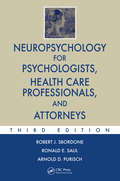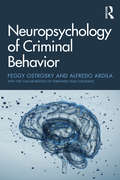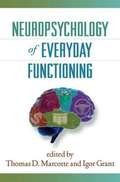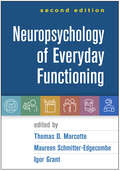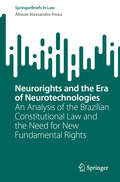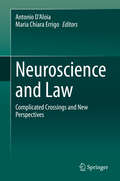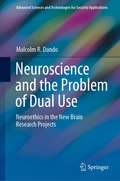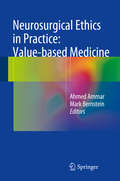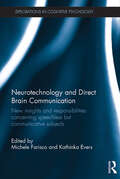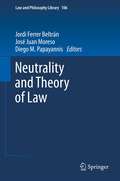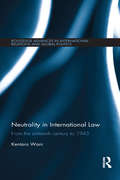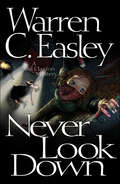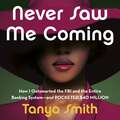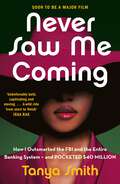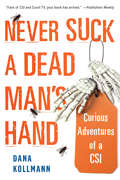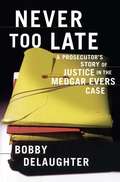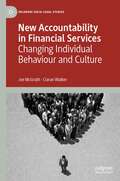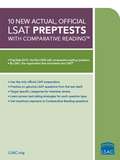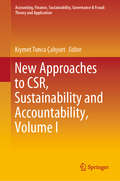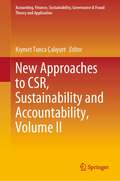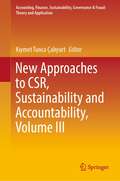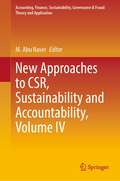- Table View
- List View
Neuropsychology for Psychologists, Health Care Professionals, and Attorneys (Rob & Smith's Operative Surgery Series)
by Robert J. Sbordone Ronald E. Saul Arnold D. PurischExtensively revised and expanded, this third edition of Neuropsychology for Psychologists, Health Care Professionals, and Attorneys provides a clear, concise, and comprehensive discussion of neuropsychology, outlining its purpose, use, and historical development. It covers the anatomy of the brain, a wide variety of neurobehavioral disorders, compr
Neuropsychology of Criminal Behavior
by Alfredo Ardila Feggy OstroskyThis book draws on findings from psychology, neurology, and genetics, to offer a multi-dimensional analysis of criminal behavior. It explores the biological bases of emotions such as aggression, anger, and hostility and how they-- combined with social psychological influences, such as family history and environmental conditions-- may lead to violence. Specific case studies, including serial killings, mass murders, family violence, cannibalism, and hitmen, are referenced throughout, providing real-world examples of these theories in action. Issues of free will and the law are discussed as well as suggestions for curbing violent behavior.
Neuropsychology of Everyday Functioning
by Igor Grant Thomas MarcotteWhile neuropsychological testing can accurately detect cognitive deficits in persons with brain injury, the ability to reliably predict how these individuals will function in everyday life has remained elusive. This authoritative volume brings together well-known experts to present recent advances in the neuropsychological assessment of key real-world capacities the ability to live independently, work, manage medications, and drive a car. For each of these domains, contributors describe cutting-edge tests, procedures, and interpretive strategies and examine salient theoretical and methodological issues. Chapters also review approaches for evaluating specific populations, including older adults and patients with traumatic brain injury, depression, dementia, schizophrenia, and other neurological and psychiatric disorders.
Neuropsychology of Everyday Functioning, Second Edition
by Igor Grant Thomas D. Marcotte Maureen Schmitter-EdgecombeThe go-to resource for assessing and predicting functional abilities in persons with brain injury or cognitive decline has now been revised and expanded to reflect significant advances in the field. With a focus on key real-world capacities--independent living, vocational functioning, medication management, and driving--leading experts explore how individuals go about their daily lives, where and why disruptions occur, and potential opportunities for improving function. Strategies for direct assessment are reviewed, from standard neuropsychological tests to multimodal approaches and technology-based tools. Chapters also provide functional assessment guidance for specific neurological and psychiatric conditions: dementia, traumatic brain injury, depression, schizophrenia, and others. New to This Edition *Incorporates over a decade of technological and methodological innovations. *Chapter on theories and models of everyday functioning. *Chapters on naturalistic assessment, wearable sensors, ambulatory assessment, and virtual-reality-based tools. *Practical clinical implications are highlighted throughout.
Neurorights and the Era of Neurotechnologies: An Analysis of the Brazilian Constitutional Law and the Need for New Fundamental Rights (SpringerBriefs in Law)
by Alisson Alexsandro PossaThis book provides an in-depth study on the theory of fundamental rights and the legal challenges posed by new technologies, with a particular focus on neurotechnologies and neurorights. The book begins with an overview of the evolution of neuroscience and neurotechnology, highlighting the current challenges these advancements pose to contemporary legal frameworks. It also discusses the potential for widespread adoption of these technologies, driven by significant investments from tech companies. The first chapter delves into the development of neuroscience and neurotechnology, emphasizing the legal implications and future concerns associated with their mass adoption. It explores how these technologies are being integrated into society and the legal challenges they present. The second chapter examines the concept of neurorights, identifying the legal objects these rights aim to protect and the new risks introduced by neurotechnologies. It provides a comprehensive review of the main neurorights proposals from recent decades, with a detailed analysis of the theoretical framework proposed by Marcello Ienca and Roberto Andorno in 2017. Their proposal includes four new human rights: cognitive freedom, mental privacy, mental integrity, and psychological continuity. The final chapter analyzes the relationship between neurorights and existing constitutional protections, focusing on the protection of human dignity. It discusses the right to free development of personality, physical and psychological integrity, and privacy and data protection. The chapter draws on theories of fundamental rights from Brazilian constitutionalists to provide a thorough examination of these issues. The book offers a broad analysis of the main neurorights proposals by international researchers, comparing them with the fundamental rights recognized in the Brazilian Constitution. It aims to determine whether new fundamental rights are necessary to protect Brazilian citizens from the potential harms of neurotechnology. This study is essential for researchers in neuroethics, neurorights, and fundamental rights, providing valuable insights into the intersection of law and emerging technologies.
Neuroscience and Law: Complicated Crossings and New Perspectives
by Antonio D’Aloia Maria Chiara ErrigoThere have been extraordinary developments in the field of neuroscience in recent years, sparking a number of discussions within the legal field. This book studies the various interactions between neuroscience and the world of law, and explores how neuroscientific findings could affect some fundamental legal categories and how the law should be implemented in such cases. The book is divided into three main parts. Starting with a general overview of the convergence of neuroscience and law, the first part outlines the importance of their continuous interaction, the challenges that neuroscience poses for the concepts of free will and responsibility, and the peculiar characteristics of a “new” cognitive liberty. In turn, the second part addresses the phenomenon of cognitive and moral enhancement, as well as the uses of neurotechnology and their impacts on health, self-determination and the concept of being human. The third and last part investigates the use of neuroscientific findings in both criminal and civil cases, and seeks to determine whether they can provide valuable evidence and facilitate the assessment of personal responsibility, helping to resolve cases. The book is the result of an interdisciplinary dialogue involving jurists, philosophers, neuroscientists, forensic medicine specialists, and scholars in the humanities; further, it is intended for a broad readership interested in understanding the impacts of scientific and technological developments on people’s lives and on our social systems.
Neuroscience and the Problem of Dual Use: Neuroethics in the New Brain Research Projects (Advanced Sciences and Technologies for Security Applications)
by Malcolm R. DandoThis book discusses recent brain research and the potentially dangerous dual-use applications of the findings of these research projects. The book is divided into three sections: Part I examines the rise in dual-use concerns within various state’s chemical and biological non-proliferation regime’s during this century, as well as the rapid technologically driven advances in neuroscience and the associated possible misuse considerations in the same period. Part II reviews the brain research projects in the EU, USA, Japan, China and several other countries with regard to their objectives, achievements and measures to deal with the problem of dual-use. Part III assesses the extent to which the results of this civil neuroscience work, which is intended to be benign, are being, and could be protected against future hostile applications in the development of novel chemical and biological weapons.
Neurosurgical Ethics in Practice: Value-based Medicine
by Ahmed Ammar Mark BernsteinGood neurosurgical practice is based not only on evidence, skills, and modern equipment, but also on good values. This book is the first to discuss specifically the ethical issues that arise during the daily practice of neurosurgery. It is divided into three parts addressing patients' rights, ethical issues relating to the working environment, and wider societal aspects such as dealings of neurosurgeons with the legal system, the media, and companies. The authors are well-established neurosurgeons who present the ethical problems that they have encountered during their careers and explain what they have learned in confronting these problems. In all, more than 50 neurosurgical cases drawn from real life are reported and discussed from an ethical point of view. This book will be especially informative for young neurosurgeons and will provide all who work in this very special field with a road map on how to avoid violations of medical ethics in neurosurgical practice.
Neurotechnology and Direct Brain Communication: New insights and responsibilities concerning speechless but communicative subjects (Explorations in Cognitive Psychology)
by Michele Farisco Kathinka EversNeurotechnology and Direct Brain Communication focuses on recent neuroscientific investigations of infant brains and of patients with disorders of consciousness (DOC), both of which are at the forefront of contemporary neuroscience. The prospective use of neurotechnology to access mental states in these subjects, including neuroimaging, brain simulation, and brain computer interfaces, offers new opportunities for clinicians and researchers, but has also received specific attention from philosophical, scientific, ethical, and legal points of view. This book offers the first systematic assessment of these issues, investigating the tools neurotechnology offers to care for verbally non-communicative subjects and suggesting a multidisciplinary approach to the ethical and legal implications of ordinary and experimental practices. The book is divided into three parts: the first and second focus on the scientific and clinical implications of neurological tools for DOC patient and infant care. With reference to these developments, the third and final part presents the case for re-evaluating classical ethical and legal concepts, such as authority, informed consent, and privacy. Neurotechnology and Direct Brain Communication will appeal to researchers and postgraduate students in the fields of cognitive science, medical ethics, medical technology, and the philosophy of the mind. With implications for patient care, it will also be a useful resource for clinicians, medical centres, and health practitioners.
Neutrality and Theory of Law
by Diego M. Papayannis Jordi Ferrer Beltrán José Juan MoresoThis book brings together twelve of the most important legal philosophers in the Anglo-American and Civil Law traditions. The book is a collection of the papers these philosophers presented at the Conference on Neutrality and Theory of Law, held at the University of Girona, in May 2010. The central question that the conference and this collection seek to answer is: Can a theory of law be neutral? The book covers most of the main jurisprudential debates. It presents an overall discussion of the connection between law and morals, and the possibility of determining the content of law without appealing to any normative argument. It examines the type of project currently being held by jurisprudential scholarship. It studies the different approaches to theorizing about the nature or concept of law, the role of conceptual analysis and the essential features of law. Moreover, it sheds some light on what can be learned from studying the non-essential features of law. Finally, it analyzes the nature of legal statements and their truth values. This book takes the reader a step further to understanding law.
Neutrality in International Law: From the Sixteenth Century to 1945 (Routledge Advances in International Relations and Global Politics)
by Kentaro WaniNeutrality is a legal relationship between a belligerent State and a State not participating in a war, namely a neutral State. The law of neutrality is a body of rules and principles that regulates the legal relations of neutrality. The law of neutrality obliges neutral States to treat all belligerent States impartially and to abstain from providing military and other assistance to belligerents. The law of neutrality is a branch of international law that developed in the nineteenth century, when international law allowed unlimited freedom of sovereign States to resort to war. Thus, there has been much debate as to whether such a branch of law remains valid in modern international law, which generally prohibits war and the use of force by States. While there has been much debate regarding the current status of neutrality in modern international law, there is a general agreement among scholars as to the basic features of the traditional law of neutrality. Wani challenges the conventional understanding of the traditional neutrality by re-examining the historical development of the law of neutrality from the sixteenth century to 1945. The modification of the conventional understanding will provide a fundamentally new framework for discussing the current status of neutrality in modern international law.
Never Again: Germans and Genocide after the Holocaust
by Andrew I. PortGermans remember the Nazi past so that it may never happen again. But how has the abstract vow to remember translated into concrete action to prevent new genocides abroad?As reports of mass killings in Bosnia spread in the middle of 1995, Germans faced a dilemma. Should the Federal Republic deploy its military to the Balkans to prevent a genocide, or would departing from postwar Germany’s pacifist tradition open the door to renewed militarism? In short, when Germans said “never again,” did they mean “never again Auschwitz” or “never again war”?Looking beyond solemn statements and well-meant monuments, Andrew I. Port examines how the Nazi past shaped German responses to the genocides in Cambodia, Bosnia, and Rwanda—and further, how these foreign atrocities recast Germans’ understanding of their own horrific history. In the late 1970s, the reign of the Khmer Rouge received relatively little attention from a firmly antiwar public that was just “discovering” the Holocaust. By the 1990s, the genocide of the Jews was squarely at the center of German identity, a tectonic shift that inspired greater involvement in Bosnia and, to a lesser extent, Rwanda. Germany’s increased willingness to use force in defense of others reflected the enthusiastic embrace of human rights by public officials and ordinary citizens. At the same time, conservatives welcomed the opportunity for a more active international role involving military might—to the chagrin of pacifists and progressives at home.Making the lessons, limits, and liabilities of politics driven by memories of a troubled history harrowingly clear, Never Again is a story with deep resonance for any country confronting a dark past.
Never Far Away
by Michael KorytaNew York Times bestselling "master" of American thriller writing Michael Koryta returns with an electrifying new novel about a mother seeking to reconnect with her children after a terrible trial tears their family apartNina Morgan&’s bloodstained car was found a decade ago on a lonely Florida road. Forensic evidence suggested she&’d been murdered, although her body was never found. Her disappearance left her infant children to the care of their father. Once a pilot, mother, wife, and witness to a gruesome crime, Nina had to flee her old life to save her family. She reinvented herself as Leah Trenton, a guide in the Allagash Wilderness in northern Maine. She never expected to see her children again, but now tragedy has returned them to her—only they have no idea that she&’s their mother—and delivered all of them back into danger. &“Aunt Leah&” will need some help, and an old ally has a suggestion: an enigmatic young hitman named Dax Blackwell. Never Far Away is a thrilling collision between old sins and new dreams, where the wills and ingenuity of a broken family will be tested against all odds.
Never Let Them See You Cry: More From Miami, America's Hottest Beat
by Edna BuchananTrue stories of crime in Miami by the Pulitzer Prize–winning author of The Corpse Had a Familiar Face. Set against the neon backdrop of the South Florida city where Miami Herald reporter Edna Buchanan covered the police beat for nearly two decades, this memoir collects true tales of both heroes and villains—from the heartbreaking to the heartwarming to the outright hilarious. &“A flurry of cases—of criminal Christmases, historic crimes, homicidal love, cop heroes, rescuers, odd occurrences (such as that of the barbiturate-soaked gunman who took 26 direct hits from cops&’ guns and kept shooting until a 27th round took him down) . . . a generous bonanza for crime buffs, presented by one of the sharpest writers in the field.&” —Kirkus Reviews
Never Look Down: A Cal Claxton Oregon Mystery (Cal Claxton Mysteries #3)
by Warren C Easley"Lawyer Cal is an appealing knight in rusty armor, seeking justice for the most vulnerable...Easley exquisitely captures Portland's flavor, and his portrayal of street life is spot-on. Readers of John Hart and Kate Wilhelm will delight in trying a new author." —Library JournalIn his first case in private practice, Oregon lawyer Cal Claxton came to the aid of a tagger calling himself Picasso, a Banksy-like figure in Portland. Dividing his time between a wine-country town and the city, the ex-L.A. prosecutor now encounters another urban teen at risk, Kelly Spence, also a tagger. Using climbing skills learned from her much-loved deceased father, a mountaineer, Kelly places angry tags in visible, hard-to-reach places. A runaway from an abusive foster home and alternative high school student, she lives with her father's former girlfriend.Kelly is four stories up at 3:00 one morning when she looks down and witnesses the brutal murder of a woman in the parking lot below. Unluckily the killer spies her but Kelly escapes. The police soon seek her as a witness. Desperate to stay anonymous, she seeks help from someone on the street she trusts. Too soon she finds his mutilated body and becomes even more afraid.Cal is drawn into the case by his volatile Cuban friend and landlord who is devastated by the murder: the dead woman had just become his fiancée. Her ex is the obvious suspect, but Cal's instincts lead him in a different direction where he will run into Kelly. Can he get her to talk, or will the killer find her first?
Never Saw Me Coming: How I Outsmarted the FBI and the Entire Banking System—and Pocketed $40 Million
by Tanya Smith'Powerfully entertaining. A true thriller of resilience and defiance' JANELLE MONÁE'Tanya Smith's story is unbelievably bold, captivating, and moving. Never Saw Me Coming is a wild ride from start to finish. She is my hero' ISSA RAEThe true story of how a middle-class Black girl from Minneapolis became one of the single biggest threats to the United States banking system.Tanya Smith fancied herself a folk hero, a kind of Robin Hood, using her powers of persuasion to buck the system and help the poor and needy.It started innocently enough, with calls to celebrities' houses with her teenage twin sister. Soon, Tanya realised she could convince utility companies to amend the balances of her friends and neighbours, clearing their overdue electricity bills with a single phone call. Eventually, as she tested the limits and realized she could get past any gatekeeper, she began to understand the power of money and what it could do. Over the years, Tanya 'confiscated' some $40 million in cash and commodities from US banks, using hacked wire transfers. It didn't take long before the FBI was on her tail. But when interviewing her, they made clear that they were using her to get to the person actually running things - clearly, she wasn't smart enough to do this on her own (Black people she was told, rob people, they don't hack computers). Thus began a cat and mouse game with the authorities that would drive her to unthinkable limits, breaking the hearts of her parents and putting Tanya's life in jeopardy before finally sending her to Federal prison (where she escaped twice) with the longest sentence ever given for a white-collar crime.In the spirit of true crime narratives like Catch Me If You Can, Molly's Game, and Ben Mezrich's Bringing Down the House, Never Saw Me Coming is also the deeply personal journey of a young Black woman finding her way in a world that underestimated her brilliance. 'It's a gripping real-life caper from a charismatic antihero. - Publishers Weekly
Never Saw Me Coming: How I Outsmarted the FBI and the Entire Banking System—and Pocketed $40 Million
by Tanya Smith'Powerfully entertaining. A true thriller of resilience and defiance' JANELLE MONÁE'Tanya Smith's story is unbelievably bold, captivating, and moving. Never Saw Me Coming is a wild ride from start to finish. She is my hero' ISSA RAEThe true story of how a middle-class Black girl from Minneapolis became one of the single biggest threats to the United States banking system.Tanya Smith fancied herself a folk hero, a kind of Robin Hood, using her powers of persuasion to buck the system and help the poor and needy.It started innocently enough, with calls to celebrities' houses with her teenage twin sister. Soon, Tanya realised she could convince utility companies to amend the balances of her friends and neighbours, clearing their overdue electricity bills with a single phone call. Eventually, as she tested the limits and realized she could get past any gatekeeper, she began to understand the power of money and what it could do. Over the years, Tanya 'confiscated' some $40 million in cash and commodities from US banks, using hacked wire transfers. It didn't take long before the FBI was on her tail. But when interviewing her, they made clear that they were using her to get to the person actually running things - clearly, she wasn't smart enough to do this on her own (Black people she was told, rob people, they don't hack computers). Thus began a cat and mouse game with the authorities that would drive her to unthinkable limits, breaking the hearts of her parents and putting Tanya's life in jeopardy before finally sending her to Federal prison (where she escaped twice) with the longest sentence ever given for a white-collar crime.In the spirit of true crime narratives like Catch Me If You Can, Molly's Game, and Ben Mezrich's Bringing Down the House, Never Saw Me Coming is also the deeply personal journey of a young Black woman finding her way in a world that underestimated her brilliance. 'It's a gripping real-life caper from a charismatic antihero. - Publishers Weekly
Never Suck a Dead Man's Hand: Curious Adventures Of A Csi (Crime Scene Ser.)
by Dana Kollmann"Informative, witty. . . Kollmann delivers terse commentary and gory detail while puncturing common misconceptions about forensics. " --Booklist Step past the flashing lights into the true scene of the crime with this frank, unflinching, and unforgettable account of life as a crime scene investigator. Whether explaining rigor mortis or the art of fingerprinting a stiff corpse on the side of the road, Dana Kollmann details her true, unvarnished experiences as a CSI for the Baltimore County Police Department. "Riveting. " --M. William Phelps, author of Murder in the Heartland Unlike the popular crime dramas proliferating on today's television networks, these forensic tales forgo glitz for grit to show what really goes on. Kollmann recounts stories that the cops and the CSI's usually leave in the field, bringing the sights, smells, and sounds of a crime scene alive as never before. "Raw and real. " --Connie Fletcher, author of Every Contact Leaves a Trace Unveiling the process and science of crime scene investigation in all its can't-tear-your-eyes-away fascination, Never Suck a Dead Man's Hand takes you into the strange world behind the yellow tape, offering a truly eye-opening perspective on the day-to-day life of a CSI. "Gritty, witty, and heartfelt . . . a must-read. " --Aphrodite Jones, New York Times bestselling author of A Perfect Husband
Never Too Late
by Bobby DelaughterIn June 12, 1963, Mississippi's fast-rising NAACP leader Medgar Evers was gunned down by a white supremacist named Byron De La Beckwith. Beckwith escaped conviction twice at the hands of all-white Southern juries, and his crime went unpunished for more than three decades. Now, from Bobby DeLaughter, one of the most celebrated prosecutors in modern American law, comes the blistering account of his remarkable crusade in 1994 finally to bring the assassin of Medgar Evers to justice. This is the fascinating, real-life story of the assistant district attorney -- played by Alec Baldwin in Rob Reiner's Ghosts of Mississippi -- who brought closure to one of the darkest chapters of the civil rights movement. When the district attorney's office in Jackson, Mississippi, decided to reopen the case, the obstacles in its way were overwhelming: missing court records; transcripts that were more than thirty years old; original evidence that had been lost; new testimony that had to be taken regarding long-ago events; and the perception throughout the state that a reprosecution was a futile endeavor. But step by painstaking step, DeLaughter and his team overcame the obstacles and built their case. With taut prose that reads like a great detective thriller, Never Too Late is a page-turner of the very highest order. It charts the course of a country lawyer who, concerned about the collective soul of his community and the nature of American justice in general, dared to revisit a thirty-one-year-old case -- one so incendiary that everyone warned him not to touch it -- and win a long-overdue conviction. DeLaughter's success in this trial stands today as a landmark in the annals of criminal prosecution, and this bracing first-person account brings the saga to life as never before.
New Accountability in Financial Services: Changing Individual Behaviour and Culture (Palgrave Socio-Legal Studies)
by Joe McGrath Ciaran WalkerThis book is a critical examination of recently introduced individual accountability regimes that apply to the financial services industry in the UK (SMCR) and Australia (BEAR and the forthcoming FAR), together with a forthcoming new individual accountability regime ( in particular, SEAR) in Ireland. It provides a framework for analysing whether these regimes will achieve behavioural change in the financial services industry. This book argues that, whilst sanctioning individuals to deter future misconduct is an important part of any successful regulatory strategy, the focus should be on ensuring that individuals in the financial services industry internalise the norms of behaviour expected under the new regimes. In this regard, the analysis in this book is informed by criminological theory, regulatory theory and behavioural science. The work also argues for a “trajectory towards professionalisation” of financial services, and banking in particular, as an important means of positively influencing industry-wide norms of behaviour, which have a key influence on firms’ and individuals’ behaviours.
New Actual, Official LSAT Preptests with Comparative Reading
by Law School Admission CouncilThis essential LSAT preparation tool encompasses PrepTest 52 (the September 2007 LSAT) through PrepTest 61 (the October 2010 LSAT).
New Approaches to CSR, Sustainability and Accountability, Volume I (Accounting, Finance, Sustainability, Governance & Fraud: Theory and Application)
by Kıymet Tunca ÇalıyurtThis book provides a platform for discussing the challenges that organizations face in order to implement sustainability, ethics, and effective corporate governance, all of which are important elements of “standing out” from other companies. Examining the background of the New European Consensus on development with the new guiding motto ‘Our World, Our Dignity, Our Future’, the authors explore how this new legislation on sustainability issues around the world is forcing companies to deal directly with sustainability issues. The 2030 Agenda for Sustainable Development (2030 Agenda), adopted by the United Nations in September 2015, is the international community’s response to global challenges and trends in connection with sustainable development. With the Sustainable Development Goals (SDGs) at its core, the 2030 Agenda is a transformative political framework designed to eradicate poverty and achieve sustainable development globally. It balances the economic, social and environmental dimensions of sustainable development, including the key issues of governance and peaceful and inclusive societies, and recognizes the essential interlinkages between its goals and targets, i.e., that they must be implemented as a whole and not selectively. The respective chapters in this volume raise a number of questions regarding companies’ ability to implement sustainability, ethics, and effective corporate governance. Simultaneously, they explore how organizations must adapt to sustainability-related developments.
New Approaches to CSR, Sustainability and Accountability, Volume II (Accounting, Finance, Sustainability, Governance & Fraud: Theory and Application)
by Kıymet Tunca ÇalıyurtThis book continues the discussion on the challenges that organizations face in order to implement sustainability, ethics, and effective corporate governance, all of which are important elements of “standing out” from other companies. Examining the background of the New European Consensus on development with the new guiding motto ‘Our World, Our Dignity, Our Future,’ the authors explore how this new legislation on sustainability issues around the world is forcing companies to deal directly with sustainability issues.The 2030 Agenda for Sustainable Development (2030 Agenda), adopted by the United Nations in September 2015, is the international community’s response to global challenges and trends in connection with sustainable development. With the Sustainable Development Goals (SDGs) at its core, the 2030 Agenda is a transformative political framework designed to eradicate poverty and achieve sustainable development globally. It balances the economic, social, and environmental dimensions of sustainable development, including the key issues of governance and peaceful and inclusive societies, and recognizes the essential interlinkages between its goals and targets, i.e., that they must be implemented as a whole and not selectively. The respective chapters in this volume raise a number of questions regarding corporate social responsibility, ethics, and corporate governance in the face of new technology, and new approaches to climate change and sustainability reporting.
New Approaches to CSR, Sustainability and Accountability, Volume III (Accounting, Finance, Sustainability, Governance & Fraud: Theory and Application)
by Kıymet Tunca ÇalıyurtThis book continues the discussion in the first two volumes on the challenges that organizations face in order to implement sustainability, ethics, and effective corporate governance, all of which are important elements of “standing out” from other companies. Examining the background of the New European Consensus on development with the new guiding motto ‘Our World, Our Dignity, Our Future,’ the authors explore how this new legislation on sustainability issues around the world is forcing companies to deal directly with sustainability issues.The 2030 Agenda for Sustainable Development (2030 Agenda), adopted by the United Nations in September 2015, is the international community’s response to global challenges and trends in connection with sustainable development. With the Sustainable Development Goals (SDGs) at its core, the 2030 Agenda is a transformative political framework designed to eradicate poverty and achieve sustainable development globally. It balances the economic, social, and environmental dimensions of sustainable development, including the key issues of governance and peaceful and inclusive societies, and recognizes the essential interlinkages between its goals and targets, i.e., that they must be implemented as a whole and not selectively. The respective chapters in this volume raise a number of questions regarding corporate social responsibility, ethics, and corporate governance in the face of new technology, and new approaches to climate change and sustainability reporting.
New Approaches to CSR, Sustainability and Accountability, Volume IV (Accounting, Finance, Sustainability, Governance & Fraud: Theory and Application)
by M. Abu NaserThis book continues the discussion on the challenges that organizations face in order to implement sustainability, ethics, and effective corporate governance, all of which are important elements of “standing out” from other companies. Examining the background of the New European Consensus on development with the new guiding motto ‘Our World, Our Dignity, Our Future,’ the authors explore how this new legislation on sustainability issues around the world is forcing companies to deal directly with sustainability issues.The 2030 Agenda for Sustainable Development (2030 Agenda), adopted by the United Nations in September 2015, is the international community’s response to global challenges and trends in connection with sustainable development. With the Sustainable Development Goals (SDGs) at its core, the 2030 Agenda is a transformative political framework designed to eradicate poverty and achieve sustainable development globally. It balances the economic, social, and environmental dimensions of sustainable development, including the key issues of governance and peaceful and inclusive societies, and recognizes the essential interlinkages between its goals and targets, i.e., that they must be implemented as a whole and not selectively. The respective chapters in this volume raise a number of questions regarding corporate social responsibility, ethics, and corporate governance in the face of new technology, and new approaches to climate change and sustainability reporting.
